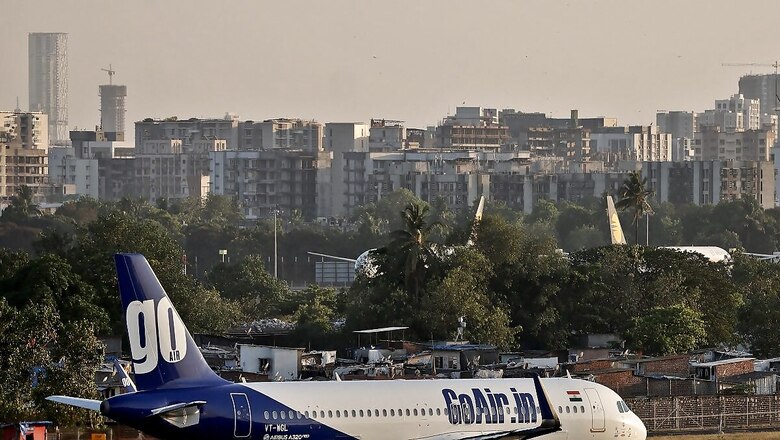
views
Go First Airways, previously known as GoAir, has announced that it is filing for voluntary insolvency with India’s National Company Law Tribunal (NCLT) due to an ever-increasing incident of engine failures. Its decision to file for insolvency comes amid the cancellation of all flights between May 3 and 5, 2023.
The airline, backed by the Indian conglomerate Wadia Group, blamed engine maker Pratt & Whitney for the increasing number of failing engines supplied to Go First, resulting in the grounding of 25 aircraft, equivalent to approximately 50 percent of its Airbus A320neo aircraft fleet, as of May 1, 2023. It cited an award issued by the Singapore International Arbitration Centre (SIC), directing the engine maker to supply ten spare leased engines every month until December 2023. Go First depends on Pratt & Whitney PW1100G geared turbofan-powered A320neo aircraft, which has been prone to incidents for a while. The engine has a long history of incidents and failures, prompting the aviation regulator to mandate deadline-based upgrades amid safety concerns.
While Go First can blame the shortage of engines as the primary trigger for the entire meltdown, look deep within, and the rot has been brewing for quite some time.
Firstly, the airline has been reeling with engine troubles for a long time. In the last year, flight cancellations became a norm, filling up social media with thousands of grieving customers. In November, the airline’s on-time performance went down to a low of 16 percent. While it did bounce back, the domino effect of delays and cancellations continued consistently. While the airline claims its 50 percent fleet is grounded right now, according to Flightradar24, almost half of its fleet has been out of service for upwards of the last three months. The airline has 54 aircraft, and at least 21 have not flown since the end of January.
Despite the early indications that things could go sour, the airline continued to sell tickets throughout its network, while cancelling flights at the last moment. An impromptu cancellation means the passenger must opt for far more expensive bookings with other carriers or ditch their travel plan entirely amid uncertain or delayed refunds. The airline is also accepting new bookings for travel in the future, going beyond May, despite an uncertain outlook. It helps them keep the cash flow open, but it is also a bad-faith strategy since even the airline is not sure whether it can honour the bookings.
The airline had enough runway to take a call early on and curb its operations to minimise the impact on passengers, then opt for a typical, instant end of operations. An instant reduction in capacity has a severely negative spillover effect since many customers need an instant alternative, leading to a sharp divide in the supply-demand ratio of other airlines, further leading to exorbitant fares.
The peak of the summer season is around the corner, a period when families venture out for their long-planned vacations. The ongoing crisis will require them to find immediate travel alternatives while trying to salvage what they can from further bookings such as hotels, activities, and more. All of which ultimately chips off value due to last-moment cancellations or a change in schedule.
While passengers are left to fend for themselves, the airline’s own crew is equally in a lurch. Firstly, the employees ranging are forced to take a pay cut, despite having done the same throughout the pandemic. On April 1, India posted a record number of 456,082 air travellers, a strong indication that the industry has recovered from the devastating black swan event. And yet, the employees of Go First not only have to take a pay cut but also tolerate delayed salary credits. The airline has delayed salaries by as much as three months before, and employees allege they are yet to be paid their dues for March and April. That is not all, the abrupt suspension of service has left many crews stranded away from their home since they are on a layover. They are now responsible for their own travel back home, irrespective of whether they are just in the next city or a faraway country like Thailand.
Aviation is a very tightly controlled industry that has no room for error. Unpaid staff is the first sign of things falling apart from an operation as well as a safety point of view.
The airline has been under stress financially for years amid the pandemic. It reported a loss of Rs 870 crore in FY21, followed by a loss of Rs 1807 crore in FY22. Over the past three years, Wadia Group, the promoter of Go First, have invested around Rs 3,200 crore ($390 million) into the business.
India’s aviation industry has never been kind to its customers and employees. We saw the same crisis unfold during the crash landing of Kingfisher and Jet Airways. The pandemic made it all even worse. But the latter could not be predicted or controlled, while a cash flow-led failure can be managed. Indian airlines have become too comfortable with the simple fact that they can raise their hands when they want, absolving themselves of all responsibility. “It’s no longer our problem, find another flight!” is the basic premise. Knocking on the doors of bankruptcy courts suddenly is a very unethical way out since the disaster has been brewing for quite some time, and yet no effort was taken to consider its implications. Raising an SOS call when the ship is already 98 percent sunk helps nobody, not even the rescuers.
It is also time for the government and regulators to start implementing stricter scrutiny of airline finances. Delayed salaries should be a huge red flag in a profession that can afford no errors. Simply gulping down supply-chain issues as a valid justification is naive. Wrapping up operations can be phased out, and considering how frequently airlines crash in our country, a framework or guidelines can help ensure the impact is not so blunt and widely felt. We can consider reforms to ensure airlines, too, have some breathing space in their business model, but that is a conversation for a different day.
Shivam Vahia actively focuses on consumer technology, aviation, and fintech. He’s a computer science engineer by qualification. Views expressed are personal.
Read all the Latest Opinions here



















Comments
0 comment